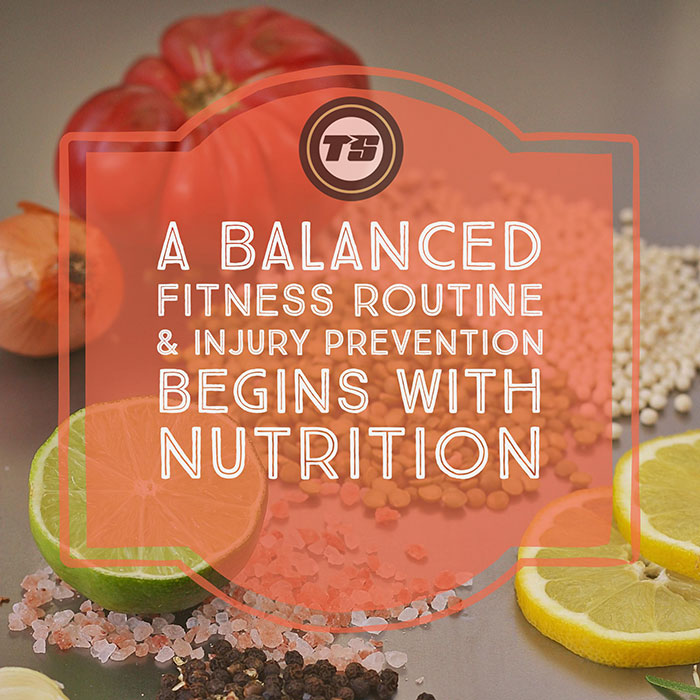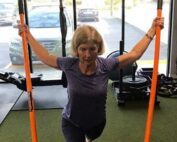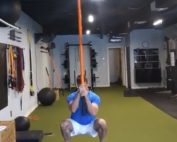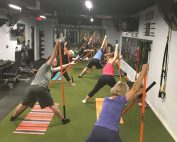A Balanced Fitness Routine & Injury Prevention Begins with Nutrition
Proper nutrition is important for a healthy lifestyle. It helps boost energy levels for work outs, slims the waistline, and even stimulates the production of endorphins. But what many don’t realize, is that it also plays a valuable role in the treatment and prevention of potential injuries.

We work hard to cross-train, strengthen, and rest our bodies to make sure they’re at their strongest. Yet, what about the fuel we put into them?
Regardless of your fitness goals, a physical injury is likely not on your list of objectives. Follow these simple nutrition tips to ensure your body is injury-free and ready to meet those fitness goals.
Caloric Intake
To prevent injury, one must intake enough calories to meet their body’s daily energy needs. This starts with taking in enough calories each day, allowing for sufficient storage of carbohydrate as muscle or liver glycogen.
We all have days where we make poor food choices, but doing so on a regular basis can lead to chronic conditions such as iron deficiency or low bone mineral density.
To prevent injury, maintain energy levels for continued workouts, or rehabilitate a current injury, it is critical that you maintain adequate levels of fluids, vitamins, minerals, protein, and carbohydrates.
Focus on a Diet Consisting of Whole Foods
I don’t know about you, but I am always on the go. I understand that, for convenience sake, it’s easier to grab a protein bar, shake, or gel as you’re running out the door. While they do offer you fuel for those times where you’re training more intensely or require additional energy, they do not offer the nutritional balance required to maintain for any length of time.
Instead, focus on fueling your body with whole foods such as lean proteins, whole grains rich in fiber, low-fat dairy, and healthy fats such as nuts and avocados.
There is no magical number of each food group required to sustain energy levels and prevent injury, as it is largely defined by your age, weight, gender, and level of physical activity. The American Orthopaedic Society for Sports Medicine offers this helpful guide; however, we always recommend consulting with a sports dietitian for the energy prescription that is right for your individual needs.
Don’t Forget the Fat!
I know, for years we’ve had it ingrained in our heads that you should avoid fat at all costs. But the reality is, your body requires fat to create those healthy membranes needed to resist damage during exercise.
In fact, some fats contribute to the compounds that help heal inflammation, preventing small injuries from becoming large ones. So, rather than eating low-fat or fat-free foods, shift your focus towards loading up on healthy, high-fat foods such as avocados, whole eggs, fish, and nuts.
Calcium
Unless you are doing swimming or cycling, stress fractures and bone strains are a common occurrence in athletes. For this reason, it’s important to maintain healthy levels of calcium at all times.
To avoid calcium deficiency and keep those bones healthy and injury-free, the recommended daily intake of calcium is between 1,000 and 1,300 mg for adults.
Schedule Your Meals Around Your Workouts
When you eat is just as important as what you put in your body when it comes to preventing injuries. Charge your body up before your workout by eating carbohydrate-rich foods. Repair muscle and tissue damage that occurs during your workout by eating protein within two hours of exercising.
Recent research shows that consuming carbs with protein post-workout is even better for your recovery, because carbohydrates restock deleted muscle glycogen levels and stimulate muscle protein synthesis.
Many of us strive to eat right and exercise to maintain a healthy body. We tend to get tunnel vision, focusing more on our fitness and weight goals and forgetting that an injury could derail us from reaching those goals.
Remember that proper nutrition is an important piece to the puzzle, and prevents us from being sidelined for days, weeks, or even months.
For more information on designing a balanced workout and nutrition program, contact Shawn@TampaStrength.com.








